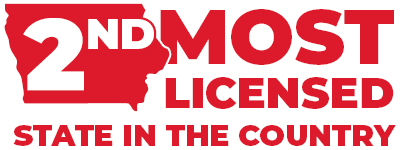Legislative Success!
A bill removing excessive licensing regulations was passed by both the Iowa House and Senate and will be sent to the Governor for her signature.
The Problem:
Iowa is the 2nd most licensed state in the country. This makes it more difficult and more expensive for Iowans to earn a living and fill high-demand jobs.


Policy solution ITR worked for:
Increase economic opportunities with:
- Job License Reviews
- Criminal Justice Reform
- Universal Recognition
- Fee waivers for low-income workers
This reform will:
- Apply common-sense criminal justice reforms to the licensure process for those with a conviction history
- Implement universal recognition, allowing new Iowa residents with an out-of-state license to use their skills and training in the same licensed profession here in Iowa without additional red tape
- Waives initial licensing fees for first-time applicants of families earning less than 200 percent of the federal poverty level
- Adds provisions related to the COVID-19 pandemic and the Governor’s proclamations during the public health emergency allowing continuing education requirements to be fulfilled online

Cut the Red Tape Tax
Unnecessary and excessive barriers are pricing people out of the workforce.
Excessive and burdensome occupational licensing laws serve as a hidden red tape tax that disproportionately impact Iowa’s working class. These laws make it more difficult and more expensive for Iowans to earn a living and fill high-demand jobs. As a state with one of the lowest unemployment rates in the country, it is time Iowa makes entering the job market easier for both current and new residents.
According to a 2018 report by the Institute for Justice, Iowa is the 2nd-most licensed state in the U.S., with 24.3% of our workforce requiring a license to do their jobs. In the 1950s, only 5% of the workforce nationally required a license to work.
“These types of things are causing a problem for [single parents] and their kids"
At a legislative round table co-hosted by Iowans for Tax Relief, a business owner said with respect to job licensing: “These types of things are causing a problem for [single parents] and their kids. We need to get that under control because there’s only so much an employer like me can do to help make up for the situation that, in essence, the state has put them in.”
Occupational licenses that protect the health and wellbeing of citizens make sense and are practical, but onerous licensing requirements can create a barrier for Iowa’s most vulnerable. Unnecessary and excessive barriers are pricing people out of the workforce.
Nebraska and Ohio addressed this problem by creating a cyclical review process. All occupational licenses are evaluated every five to six years to determine if the requirements, and each license itself, are necessary. Licensing requirements should be reasonable and designed to ensure the health and safety of consumers.
A second important piece of occupational licensing reform is a criminal justice component. Earlier this year, Iowa removed a permanent ban on those with past criminal convictions so they can now work in the plumbing and electrical fields. However, many broad bans for those with past felonies still exists. Previous offenders who have demonstrated they are unlikely to re-offend and have not committed crimes related to the profession should be allowed to advance their careers. Non-violent offenders who have already paid their debt to society should not be forced to repay that debt for the rest of their lives.
Arizona waives licensing fees for those under 200 percent of the poverty level as another means to give Arizonans the ability to work; doing the same in our state would open opportunities to even more Iowans.
A final important element of job licensing reform is universal recognition. If a person has proven they can successfully do a job by one state’s standards, shouldn’t they be able to continue their profession in another state? In 2019, Arizona enacted a new law recognizing licenses from other states. This type of reform is particularly valuable for military spouses who move from state to state with their families.

Occupational licensing makes it harder for Iowans to work, and it drives up costs for all Iowans. It is time for Iowa to review its job licenses, create meaningful criminal justice reforms, increase economic opportunities, and establish universal recognition. These reforms would encourage people not just to move into our great state but to also pursue their chosen careers and professions.
Related Posts

Occupational Licensing Reform

Gov’t Standing in the Way of A Basic Freedom

2021 Tax Day Virtual Luncheon

Iowa and Nebraska Should Trade Playbooks

Lather, Rinse, Repeat; More Reform is Still Needed

Major Licensing Reforms Deliver Opportunity

Removing Excessive Licensing Regulations

Show Me Reform

Cutting Bureaucratic Red Tape

Imagination, and Gov’t, Are the Only Limitations

